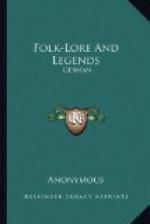Their houses are called large and fair, and (unless at some odd occasions) unperceivable by vulgar eyes, like Rachland and other enchanted islands, having fir lights, continual lamps, and fires, often seen without fuel to sustain them. Women are yet alive who tell they were taken away when in childbed to nurse fairy children, a lingering voracious image of them being left in their place (like their reflection in a mirror), which (as if it were some insatiable spirit in an assumed body) made first semblance to devour the meats that it cunningly carried by, and then left the carcass as if it expired and departed thence by a natural and common death. The child and fire, with food and all other necessaries, are set before the nurse how soon she enters, but she neither perceives any passage out, nor sees what those people do in other rooms of the lodging. When the child is weaned, the nurse dies, or is conveyed back, or gets it to her choice to stay there. But if any superterraneans be so subtle as to practise sleights for procuring the privacy to any of their mysteries (such as making use of their ointments, which, as Gyges’ ring, make them invisible or nimble, or cast them in a trance, or alter their shape, or make things appear at a vast distance, etc.), they smite them without pain, as with a puff of wind, and bereave them of both the natural and acquired sights in the twinkling of an eye (both these sights, when once they come, being in the same organ and inseparable), or they strike them dumb. The tramontanes to this day place bread, the Bible, or a piece of iron, to save their women at such times from being thus stolen, and they commonly report that all uncouth, unknown wights are terrified by nothing earthly so much as cold iron. They deliver the reason to be that hell lying betwixt the chill tempests and the firebrands of scalding metals, and iron of the north (hence the loadstone causes a tendency to that point), by an antipathy thereto, these odious, far-scenting creatures shrug and fright at all that comes thence relating to so abhorred a place, whence their torment is either begun, or feared to come hereafter.




